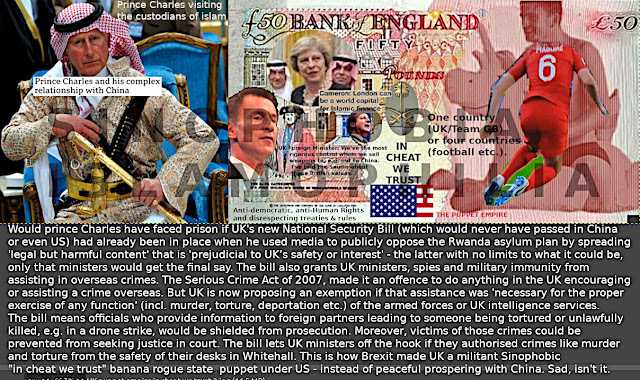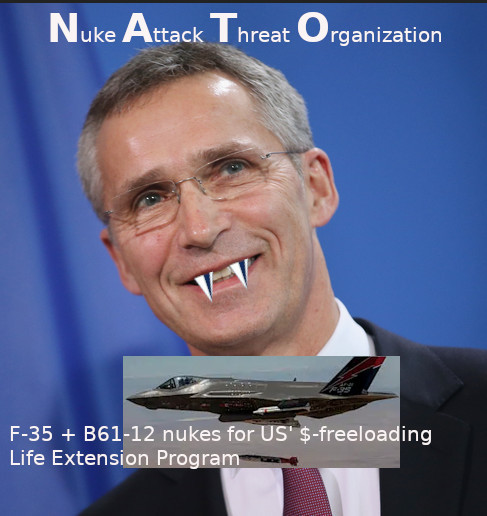UK's (anti)Human Rights Act, National Security Bill, and Online Safety Bill, turn UK into a dangerous parody of a democracy!
Do you really want UK soldiers in your country - and US s.c. low yield nukes meant for tactical real use?!
UK law is given precedence over international law - yet UK always refers to international law and Human Rights when it comes to China - A China that outperforms the West when it comes to Human Rights (even OIC approves of China's re-education of previously home locked uneducated muslim women); privacy law (at least on pair with EU's similar law - and way ahead of US an its puppet UK), meritocratic real democracy from below to the top; China's peaceful belt and road program for trade and progress instead of the West's dangerous militarism and how its master $-freeloader US has initiated a string of senseless bloody wars (incl. in Ukraine where the puppet regime - which now has dictatorially eliminated all opposition parties - committed and commits real genocide against its own Russian people with the help of Nazis supported by the West).
Would prince Charles have been jailed if the new National Security Bill had been in place when he used public media to spread 'legal but harmful content' that is 'prejudicial' to the UK’s 'safety or interest'?
The
new bill sets no limits to what could be considered 'an interest' or
'legal but harmful content' – only that ministers would get the final
say.
Journalists and activists who share leaks of official
information to oppose government policies could face imprisonment under
the National Security Bill if they belong to organisations that have
been given grants by other countries (read China).
And if the UK
government decided that the UK’s energy situation required an immediate
expansion of fracking or the building of coal fired or nuclear power
plants, the use of leaked information which could undermine that policy
could be a criminal offence under the bill.
Moreover, the
offences are so widely drawn that whistleblowers who reveal a trade
secret while raising concerns about fraud or corruption to foreign
regulator or law enforcement or to a foreign-owned media outlet could be
committing a criminal offence that carries a sentence of life in
prison.
The bill doesn't include a public interest defence in the
bill, which would allow campaigners and journalists to challenge
offences for sharing leaks.
The bill also widens the definition of what information is illegal to share.
The
sharing of certain confidential official information is already a
criminal offence under the Official Secrets Act 1989 – but only if the
data relates to security and intelligence, defence or international
relations. The National Security Bill removes these limits. It would
make the sharing of any official information for or on behalf of a
foreign power (a definition that includes working for an organisation
that has received funding from overseas governments) an offence if it is
restricted in any way 'for the purpose of protecting the safety or
interests of the UK'.
It potentially means that if a media
organisation or NGO has ever received funding from a non-UK government,
then it cannot share any information that the government hasn’t actively
disclosed. Finding and reporting official information that is
‘restricted’ in some way is more commonly known as journalism.
The
bill could also be applied to any information that the government has
refused to disclose via a Freedom of Information (FOI) request, as that
refusal would constitute a restriction. The government’s record on
disclosing information through FOI has been abysmal.
The bill will allow ministers to decide what information is legal or illegal to share.
The
bill would make sharing official information an offence when it is used
in a way that is prejudicial to the UK’s “safety or interest”.
In
the bill’s explanatory notes, even the government admits that this term
is “not defined” – but argues that case law has set a precedent for
ministers to determine what is the safety or interest of the UK.
The
bill grant ministers and spies immunity from assisting in overseas
crimes. So while making it harder for journalists to reveal ministers’
wrongdoing, the bill also perversely grants immunity to ministers or
spies who assist in overseas crimes.
The Serious Crime Act,
which was passed in 2007, made it an offence to do anything in the UK
encouraging or assisting a crime overseas. But the Home Office is
proposing an exemption if that assistance was 'necessary for the proper
exercise of any function' of the armed forces or UK intelligence
services.
The bill would mean officials who provide information
to foreign partners leading to someone being tortured or unlawfully
killed in a drone strike, for instance, would be shielded from
prosecution. Moreover, victims of those crimes could be prevented from
seeking justice in court. The bill could also let ministers off the hook
if they authorized crimes.



No comments:
Post a Comment